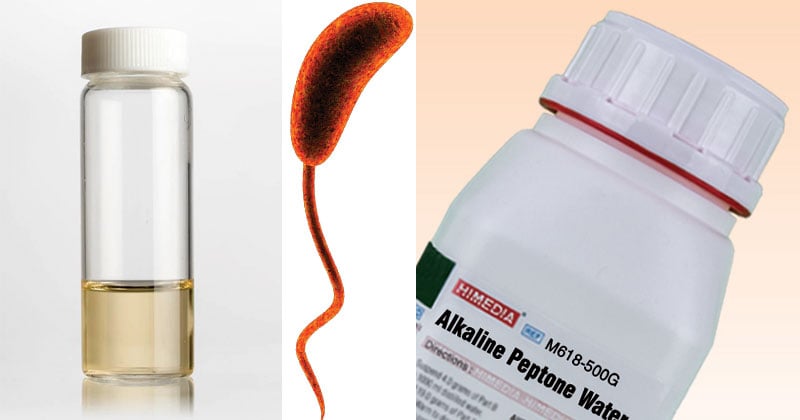Alkaline Peptone Water is a broth medium for the enrichment of Vibrio species from food, water, and clinical samples. Shread, et al. formulated peptone water for use as a nonselective enrichment broth for the cultivation of Enterobacteriaceae from foodstuffs and other specimens. It is a modification of peptone water with the pH adjusted to 8.4. The alkaline pH of this medium allows the growth of Vibrio organisms while inhibiting the growth of commensal intestinal bacteria. Enrichment of specimens in Alkaline Peptone Water prior to inoculation of plated media has been shown to increase the recovery rate of Vibrio spp.

Interesting Science Videos
Composition of Alkaline Peptone Water
| Ingredients | Gms/liter |
| Peptone | 10.0 |
| Sodium Chloride | 20.0 |
Final pH (at 25°C): 8.6 ± 0.2
Principle of Alkaline Peptone Water
- There are various methods available for the isolation of Vibrio species from environmental, food and clinical samples.
- These generally involve a pre-enrichment step followed by plating onto a solid medium and morphological, biochemical and serological identification.
- The Alkaline Peptone Water medium can be used to effectively cultivate Vibrio species. It is a suitable enrichment broth for this purpose.
- The 2% (w/v) sodium chloride incorporated in this medium promotes the growth of Vibrio cholerae, while the alkalinity of this medium inhibits most of the unwanted background flora.
- Peptone provides nitrogen and carbon source, long chain amino acids, vitamins and other essential nutrients. Sodium chloride maintains osmotic equilibrium.
Preparation of Alkaline Peptone Water
- Add 20g to 1 litre of distilled water.
- Mix well, distribute into final containers and sterilize by autoclaving at 121°C for 15 minutes.
- Inoculate swab specimens directly into Alkaline Peptone Water.
- Material not being cultured directly from a swab may be transferred into the medium using a sterile microbiological loop.
- For faecal specimens, aseptically transfer approximately 1g of the sample to the medium and mix well.
- The inoculated broths are generally incubated at 35-37°C for 5-6 hours or 18-20 hours at 18-20°C.
Result Interpretation on Alkaline Peptone Water
Growth in tubes is indicated by turbidity compared to an un-inoculated tube (control).
| Organisms | Growth |
| Vibrio parahaemolyticus | Turbid growth |
| Vibrio vulnificus | Turbid growth |
| Vibrio furnissii | Turbid growth |
| Vibrio cholerae serotype Inaba | Turbid growth |
| Vibrio cholerae serotype Ogawa | Turbid growth |
Uses of Alkaline Peptone Water
- It is commonly used for the enrichment of Vibrio cholera and Vibrio species from food, water and clinical samples.
- The broth can also be used for direct microscopic examination of samples using the hanging drop method.
- It is used as both enrichment and transport media.
- Initially, it was used as a non-selective enrichment broth for the cultivation of Aeromonas
Limitations
- Prolonged incubation will result in growth of the suppressed contaminating organisms to develop.
- Growth from the enrichment broth is used for plating on selective media. For biochemical identification a pure culture is recommended.
- Certain strains of Vibrio species requiring higher sodium chloride concentration may show poor growth.
- Further recovery from this enriched broth onto selective media is required.
- Biochemical characterization is carried out from pure isolates for complete identification.
References
- http://www.oxoid.com/UK/blue/prod_detail/prod_detail.asp?pr=CM1028&c=UK&lang=EN
- Laboratory Methods for the Diagnosis of Vibrio cholerae; Centers for Disease Control and Prevention
- Isenberg, (Ed.), 1992, Clinical Microbiology Procedures Handbook, Vol. I, American Society for Microbiology, Washington, D.C
- http://himedialabs.com/TD/M618.pdf
- https://assets.thermofisher.com/TFS-Assets/LSG/manuals/IFU60052.pdf

Thanks for ur lectures.pls,in diary industry (milk, yoghurt etc), which media is most effective in detecting enterobacteriaece family :violet red bile agar or MAC agar or it broth